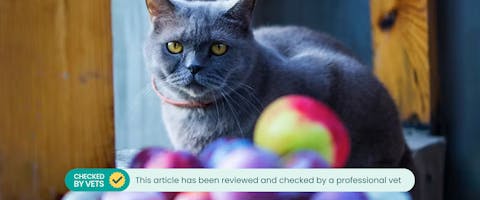Updated 12/05/2023
Plums are certainly a regular (and welcome) staple in our five-a-day, but what about our feline friends - can cats have plums, or are plums poisonous to cats?
The short answer is no, cats definitely shouldn’t eat plums - and doing so could land them into some serious trouble.
Read on as we delve into why this small fruit isn't quite as innocuous as it seems, and what to do if your kitty accidentally eats this (potentially sinister) snack…
Trending posts
Purr-use some of the top blogs our members have been loving this month- Top male dog names for your new furry friendGot a new furry family member in your pack? Check…

- Top female dog names for your new fluffy palWelcoming a new pooch into your family? Explore…

- 250+ gray cat names your silver feline will loveRecently welcomed a fluffy gray bundle of joy into…

- What are normal pet sitting rates?Discover the average pet sitting rates for animals…

- Unique dog names to stand out from the packDare to be different with our list of the best…

Are plums poisonous to cats?
Yes - according to the ASPCA, most parts of the plum are toxic to cats, including the stems, leaves and seeds - all of which contain cyanide. Cyanide is extremely toxic to our pets and can poison them.
Wilting plums, the ASPCA notes, are particularly toxic to our feline friends (not to mention, dogs and horses too). Avoid at all costs.
Plum stones (seeds/pits) contain the cyanide toxin. They can also cause a choking hazard for our pets if they eat the stones, or even cause tooth fractures if they try and chew them.
Can cats eat plum fruit?
Again, it’s a no. While the stems, leaves, and seeds are the most toxic part of a plum, cats should also avoid eating the flesh or skin of a plum. It’s just not worth the risk. Plum fruit is not a natural part of our cats’ diets and can cause stomach upset including vomiting and diarrhea. Plum fruit is also very high in sugar, which is not good for our feline friends. If you think your cat has eaten some plum fruit, it is best to contact your veterinarian for advice.
What to do if your cat eats plums
The non-fruit parts of plums are toxic to cats (even in small amounts) and can cause some seriously nasty symptoms. So, if you suspect your cat has eaten part of a plum, be sure to contact your vet immediately.
Symptoms of plum poisoning
If you suspect your feline friend may have consumed some plum, the ASPCA advises there are a few main symptoms to look out for, including:
- Dilated pupils
- Difficulty breathing
- Excessive panting
- Shock
- Brick red mucous membranes
If left untreated, plum poisoning can lead to death. It’s important to note that your cat may not have these symptoms, but could be still at risk of health issues if they have eaten parts of a plum. Therefore, it's really important to contact your veterinarian for advice if you suspect your cat has ingested some plum, especially the non-fruit parts of the plant.
Meet our veterinary expert, Evie
This article has been checked by veterinarian Evie Moloney RCVS. Evie is a vet surgeon who graduated from the University College Dublin, which is the only university offering the veterinary medicine degree in Ireland. She really enjoys surgery and has also worked as an emergency and critical care vet. She is passionate about sharing education about preventative health care
for pets, especially the importance of regular dog and cat teeth brushing at home. She also enjoys helping owners find practical solutions for keeping pets as comfortable as possible while living with conditions such as arthritis. When not working, she enjoys hiking and swimming.
Other foods that aren’t safe for cats
So, now you know the answer to 'can cats eat plum' is a big ‘nope’. But, there are plenty more foods that our fluffy friends should avoid, including:
As a pet parent, it always pays to know what’s safe and what’s not when it comes to our feline friends. Learn more about what cats can and can’t eat here.

